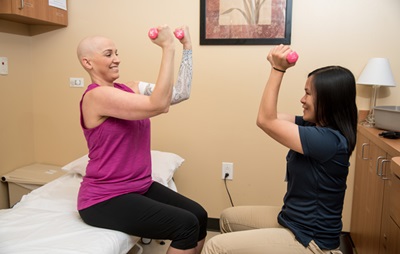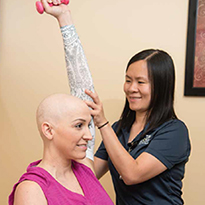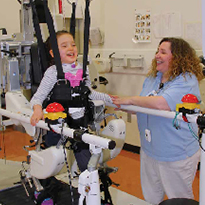Cancer Prehabilitation
TIRR Memorial Hermann offers cancer prehabilitation for individuals who are newly diagnosed with cancer before they start their cancer treatments. The goal of cancer prehabilitation is to provide rehabilitation assessments that establish a baseline functional level, identify impairments and provide interventions that promote physical and psychological health to prevent or lessen the severity of anticipated treatment-related problems that could lead to later disability.
Cancer prehabilitation has many potential benefits that may include:
- improvement of physical and psychological health outcomes
- improvement of functional abilities
- reduction of pain
- lessening of emotional stress
- prevention of hospital readmissions
- improved quality of life
We have a knowledgeable outpatient oncology-dedicated interdisciplinary team that includes:
- Occupational therapist
- Physical therapist
- Speech-language pathologist
During the prehabilitation assessment, the clinician will determine a patient’s baseline status and design interventions that improve functional limitations before cancer treatment begins. Prehabilitation may include, but not limited to any of the following:
- Strengthening of weak core, arm and leg muscles, swallowing muscles
- Cardiovascular endurance training
- Range of motion and stretching exercises
- Fatigue management and energy conservation techniques
- Functional mobility training
- Memory and attention strategies
- Emotional status management
Prehabilitation services should not delay the start of cancer treatments. A prescription from a doctor is needed for all prehabilitation services.
Breast Cancer Rehabilitation
TIRR Memorial Hermann offers outpatient rehabilitation for breast cancer survivors. An individualized treatment program is created to optimize a patient’s journey to success in achieving personal goals, at the time of diagnosis, during and after cancer treatment. We provide an environment that gives patients, their families and caregivers the opportunity to participate in important life roles and get back to the life they love.
We have a knowledgeable outpatient oncology-dedicated interdisciplinary team which may include:
- Occupational therapist
- Certified lymphedema therapist
- Physical therapist
- Clinical social worker
- Neuropsychologist
- Chaplain
Breast cancer survivors facing any of these challenges may be appropriate for cancer rehabilitation:
- Fatigue
- Weakness
- Difficulty moving arms for dressing, bathing, grooming, positioning for radiographs
- Peripheral neuropathy
- Joint pain
- Lymphedema
- Osteopenia/osteoporosis
The Breast Cancer Rehabilitation Program maximizes patient outcomes by providing assessment and treatments before, during and after cancer treatment, including follow-up in these areas:
- Arm mobility
- Sensation and fine motor coordination
- Activity tolerance
- Strengthening and conditioning
- Education and support
- Lymphedema
- Balance
 TIRR Memorial Hermann and the Memorial Hermann Rehabilitation Network offer comprehensive rehabilitation for those affected by cancer in the inpatient, outpatient rehabilitation and outpatient medical clinic settings.
TIRR Memorial Hermann and the Memorial Hermann Rehabilitation Network offer comprehensive rehabilitation for those affected by cancer in the inpatient, outpatient rehabilitation and outpatient medical clinic settings.

